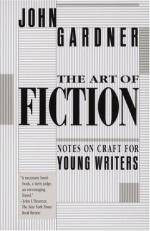|
This section contains 702 words (approx. 3 pages at 300 words per page) |

|
[Freddy's Book] is a well-written, persuasive, philosophically dramatic, and concise work in which Gardner brings into explicit, exciting battle the debilitating forces of the late 20th century existentialism and the right, or the will, to be happy, secure, and productive in life….
An admirably good, peaceful hero like Lars-Goring would be fictionally weak if the novelist considered his goodness as a Leavisian moral absolute; hence the battery of existential "tests" Gardner subjects him to. Such tests are the moral transcriptions of Gardner's intuition of real-life pressures. The qualities of endless conflict and dread, verifiable to the reader's own experience, renders the entire novel (and in particular the goodness of Lars-Goring) more mature, more poignant, more meaningful. It is the imagination's freedom from deterministic moral principles (Gardner's initial definition) that permits the kind of enlarging contrast Gardner presents so successfully in Freddy's Book.
Working from one's intuition of real...
|
This section contains 702 words (approx. 3 pages at 300 words per page) |

|


